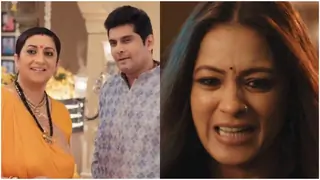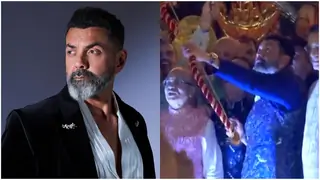The Tuesday of October 31, 2000 marks 25 years, to the day, since that titan with whom we tuned all through his 30 years in Hindustani cinema, Sachin Dev-Burman, shuffled off his mortal coil.
Dada Burman had been in a coma for nearly a year before October 31, 1975 -- the Friday on which he finally passed away. It was a coma that followed a stroke SD suffered while recording Kishore Kumar -- set to go, unforgettably, on Amitabh Bachchan (opposite Jaya Bhaduri playing Mili) as Badee soonee soonee hai zindagee yeh zindagee.
That traumatic Dada breakdown accounts for why Kishore Kumar handpicked this 1975 Badee soonee soonee hai mood song to figure among his Ten All-Time Bests in The Illustrated Weekly Of India cover story (titled Genius), on him, done by Pritish Nandy.
1975 was also the year by which Dada Burman had virtually replaced the multi-faceted Mohammed Rafi with the multi-hued Kishore Kumar in his repertoire.
Having done that, Dada vainly tried to soften the blow for Rafi by getting this singer to duet with Kishore (in Hrishikesh Mukherjee's Chupke Chupke: 1975) as Sa re ga ma, aa ha, ma sa re ga.
It was Rafi here going on Dharmendra (the superstar-that-almost-was) in a ribtickling role opposite the superstar-that-already-was: Amitabh Bachchan.
Dada Burman had personally recorded Sa re ga ma before he slipped into that coma. A prolonged coma from which, Rahul Dev-Burman told me, he once ventured to shake Dada awake by conveying to football buff SD the glad tidings that his East Bengal had thrashed Mohun Bagan!
"Dada nodded just enough to make it clear that he had heard and absorbed The Happening!" Pancham told me.
Nor was Dada Burman into football alone. I had seen SD (seated enthusiastically on the front stone-bench) during a hockey final at the stadium adjoining the Churchgate Station in the sporty metropolis of Bombay. In fact, Dada Burman was the Master Conductor at a Music Nite organised (at the same stadium venue) to raise funds for the Bombay Hockey Association.
Here, at that Nite, was where I beheld S D Burman patting Mohammed Rafi on the back, as that tenor gave super expression to Dada's 1958 Raag Chhayanat Majrooh-written classic on Dev Anand in Kala Pani: Hum bekhudee mein tum ko pukaare chale gaye.
It was from the muezzin's call to prayer that Dada Burman had picked up the tune-idea for Hum bekhudee mein tum ko pukaare chale gaye -- a call running as Ahl-e-rasool mein jo Musallama ho gaye.
Any wonder Rafi gave such heart-stopping articulation to Hum bekhudee mein?
Ha, Mohammed Rafi! Did this stalwart performer deserve, finally, to be treated the way he was by Sachin Dev-Burman, even granting that Rafi's easing out from Dada's recording room came about following an Aradhana breakthrough by Kishore Kumar that sigalled the arrival of Rajesh Khanna as the superstar to upset all settled values in our films?
Roop tera mastaana pyaar mera deewaana; Mere sapnon kee raanee kab aayegee too; even that Raag Pahadi duet of Kishore with Lata, Kora kaagaz thha yeh man meraa, weren't these tunes initially envisioned, by Dada Burman, to go in the voice of Mohammed Rafi on a still-to-arrive Rajesh Khanna?
Since SD's tunes here were to be picturised on a hero (Rajesh Khanna) yet 'on the fringe', Dada Burman had, anticipating the demand of the razzledazzle film trade, logically chosen, as his main male singer for Aradhana, the then voice of every other leading man in films: Mohammed Rafi.
Indeed, by getting the first two songs that were recorded for the film, Baaghon mein bahaar hai (with Lata Mangeshkar) and Gunguna rahe hain bhanwre (with Asha Bhosle), to be by Rafi, Dada Burman had already indicated his choice of voice for Aradhana.
But this was the point at which S D Burman fell critically ill.
And here is where we come to the gut point about certain readers holding me to my 1994 view that it was "R D Burman, and not S D Burman, who conceived and executed the music score of Aradhana."
So it was -- but only after those two duets came to be "conceived and executed" (that is, recorded) by S D Burman in the voice of Rafi!
That was the norm in our films then. That, first, two songs of a production had to be recorded -- as the launching-pad. Plus the news of such a recording had to appear as a published item in an industry-respected paper like the weekly Screen.
Only after that would finance for a film flow. So it was as finance for Aradhana was set to flow that SD fell ill.
So ill that R D Burman, behind the scenes, took over the remaining music of Aradhana for Kishore Kumar really to happen. Happen after that peerless singer had been, for a full 23 years, 'on the periphery' -- always a vibrant voice, but never quite there, in the topmost echelons of a field right then dominated by Mohammed Rafi, as a playback performer way ahead of the rest towards the end of the 1961-70 decade.
A performer no less ahead was Lata Mangeshkar among the lady performers. For Lata, Asha was some competition by the Aradhana-release stage of 1970.
------------------------------------------------------------ --------------------
A performer no less ahead was Lata Mangeshkar
among the lady performers
------------------------------------------------------------ --------------------
But, in the case of Rafi, he was the singing monarch of all he surveyed, by early-1970, as the voice of every selling hero -- from Rajendra Kumar to Shammi Kapoor, Sunil Dutt to Dharmendra, Joy Mukerji to Jeetendra.
It was the joint hold of this legion of heroes that Rajesh Khanna singly challenged -- and how! This was something that transpired through Kishore Kumar emerging as the 'youthful' voice of Rajesh Khanna with Aradhana -- via the baton of Sachin Dev-Burman.
I say Sachin Dev-Burman in the face of the fact that it was Rahul Dev-Burman who handled the 'core' music of Aradhana, Dada Burman being too ill to attend any of the rehearsals after recording those first two duets featuring Rafi.
And, into these rehearsals, it was Pancham who subtly brought in Kishore, having never been a great Rafi votary!
Dada Burman was in no physical position really to object even if he heard about this. And, by the time S D Burman recovered enough to be at least there during the final Aradhana recordings, Pancham had it all wrapped up and ready in the voice of Kishore Kumar!
How history shapes the destiny of singing men and matters!
Had Dada Burman returned to the Aradhana recordings in robust health -- as a musicperson who always knew his mind and asserted his will -- SD, very likely, would have taken umbrage at Pancham going against his expressed wishes -- that it had, here, to be Rafi all the way.
But Dada was barely back on his feet now. And, let's face it, SD never had been against Kishore per se.
In fact, SD had sided with Kishore even when other composers gave up on this singer because of his penchant for playing recording truant. For Dada had spotted the spark in Naughty Boy Kishore during Ashok Kumar's1946 Bombay Talkies' Shikari days itself.
So here we come to the crux of the matter.
In better health, Dada Burman might even have vetoed Pancham's idea of it being Kishore in the already allotted Aradhana slot of Rafi. And Dada, do remember, would have had the distributors of Aradhana on his side in the matter -- these financiers would, obviously, have wanted the then No 1 voice of Rafi going on a still-struggling hero like Rajesh Khanna.
Yet Dada obviously liked what he heard in the voice of Kishore -- as fashioned by Pancham from the 'rough-cut' tunes he had given his son for Rafi to rehearse for Aradhana!
Dada was not forthcoming on this ticklish issue when I asked him pointedly about it, so shall we say that SD was not entirely surprised at Pancham having turned to Kishore, knowing how his son never really did care for Rafi?
The thrust of my reasoning is simple. I contend that it was the serious illness of Dada Burman -- in the moment that mattered -- that was the making of Kishore and the undoing of Rafi. For we tend to judge Aradhana, today, by the sum total of the terrific impression left by Kishore on a Rajesh Khanna hitting the screen like a tornado with that 1970 release.
But, honestly, did Rafi, in the same Aradhana, sound any less effective, on the same Rajesh Khanna, while vocalising Baaghon mein bahaar hai and Gunguna rahe hain bhanwre?
Only, these were duets, while Kishore's Roop teraa mastaana and Mere sapnon kee raanee were solos on the neo-Rajesh Khanna! And a credit shared (with Lata and Asha) is a credit halved was the painful discovery that Rafi now made, as Aradhana turned out to be a musical pathfinder.
For all that, what if Dada Burman had come back, totally recovered, and torpedoed Pancham's decision that it should be Kishore Kumar on Rajesh Khanna in Aradhana, when that film's final box office fate was still totally unknown?
So it was the fact that Dada Burman, in the nick of time, fell so ill as to be bedridden that worked in overnight favour of Kishore.
Or shall we simply argue that Kishore's time had at last come, seeing how superbly this performer, finally, sang the Aradhana theme? Argue that Kishore and Rajesh were vocally 'made for each other'? Audio-visual rationalising is the easiest thing in the film world!
So Pancham it was who tellingly turned the Aradhana tables in favour of Kishore by recasting, in his pet singer's idiom, those base-tunes set by Dada Burman (on his sickbed harmonium) in the Rafi mould!
The point still remains whether Rafi, left to himself on Rajesh Khanna, would have sung Aradhana as impactively as did Kishore. There is absolutely no reason, considering Rafi's vocal splendour then, to doubt his ability to have been any less impressive than Kishore.
Kishore, for his playback part, knew that it was still 'touch-and-go', in the case of Aradhana, when Dada returned by the final recording stage. For Dada's last memory here, as he fell ill, related to what he considered his lifetime-best score in Guide -- to Rafi's Tere mere sapnen ab ek rang hai; to Din dhal jaaye haay raat na jaay; and, transcendentally, to Kya se kya ho gaya.
By contrast, Dada's Guide rewind to Kishore was marginal -- confined to this singer's Raag Pahadi duet with Lata: Gaata rahe mera dil.
No doubt, Dada here took note of how surpassingly Kishore had rendered Gaata rahe mera dil with Lata. Yet Rafi's virtuosity under Dada in Guide -- it had taken that singer and the composer in S D Burman to a new peak, hadn't it?
But then, after Aradhana, Sachin Dev-Burman had to reckon with the fact that son Rahul Dev-Burman was the new trendsetter -- that almost every hero had 'fallen in Rajesh Khanna line' by ditching Rafi for Kishore!
And Dada Burman, as a realist, never was one to play King Canute and try to roll back the waves!
His son, Pancham, had used a prestigious film of his, Aradhana, to tilt the scale, decisively, in favour of Kishore. And Dada Burman had nothing against Kishore, his own discovery -- now that this singer, realising his full potential late in his performing life, had become regular in the matter of both rehearsing and recording.
What Rafi thus found himself confronted with was an exodus in the direction of Kishore. That Rafi staged a comeback in the face of such overwhelming odds is a tribute to the man and his artistry. But it would be only objective to record here that, in the teeth of being the far better-trained singer, Rafi now, strangely, seemed to follow where Kishore led.
Just one recording happening should help drive home the S D Burman point here. Take the very first song that was to be recorded for Dev Anand playing Gambler (1971).
By this stage, Aradhana had left its tell-tale trail -- still Dada Burman could not quite forget Mohammed Rafi and his vocalising on Dev Anand as Guide!
So Dada sent for Rafi to record the first song that he had composed for Dev Anand playing Gambler.
The arrangement was that, from Rafi Villa, this singer would come to Dada Burman's nearby The Jet bungalow (in the Linking Road sector of the West Bandra suburb in Bombay).
Dada had already rehearsed Rafi thoroughly for the song, due to be recorded at Famous (Cine) -- a venue not far from the Haji Ali (Mahalakshmi) landmark of Bombay. Rafi now offered that Dada and he drive towards Mahalakshmi in his car.
But Dada insisted that the two should travel in his own Fiat. For Dada wanted at least one final rehearsal with Rafi in his car.
And this rehearsing Dada would not have felt comfortable carrying out (sitting behind Rafi's driver) in the singer's own car! It had to be done sitting behind Dada's driver in his own car. If only because that man had heard SD rehearse Rafi in that very Fiat a number of times before.
By the time Dada and Rafi reached Famous (Cine), 10-12 kilometres away, this singer was rarin' to go. And Dada that time, I remember, okayed the first take of Rafi's Mera man tera pyaasa -- to go on Dev Anand as Gambler!
So what, may I ask, was wrong with Rafi's Dev-empathising rendition of Mera man tera pyaasa, that it had to be, in the same Gambler after that, Kishore on Dev Anand in Haan, kaisa hai mere dil too khiladee/Bhar ke bhee hai tera pyaala khalee; Choodee naheen yeh mera dil hai; and Dil aaj shaiir hai gham aaj naghma hai/Shab mein ghazal hai sanam?
How good is Kishore in his soliloquising for Dev Anand under Sachin Dev-Burman here? He is simply superb.
But then, I ask afresh, what is remiss with Rafi's soliloquising of Mera man tera pyaasa on the same Dev Anand?
If it comes to that, after Aradhana, what is amiss with Rafi's voice in a whole array of S D Burman compositions moving, in Talaash, from Palkon ke peechche se kya tum ne keh daala to Aaj ko junalee raat ma (both with Lata)?
Take, in SD's Ishq Par Zor Nahin, Rafi's Mehbooba teree tasveer solo and his Yeh dil deewaana hai duet (with Lata).
There are other post-Aradhana Rafi renditions to underscore this singer's abiding resonance in the custody of S D Burman, but where does the exercise get us now?
The turning-point was Dada Burman's deciding to stay with Kishore Kumar, as prescribed by Pancham, in Aradhana.
Indeed, by the time Aradhana unfolded as S D Burman's 'second coming', Pancham was already on the verge of an individual breakthrough via Kati Patang -- via Kishore's Yeh shaam mastaanee madhosh kiye jaaye; Yeh jo mohabbat hai yeh unka hai kaam; and Pyaar deewaana hota hai mastaana hota hai -- songs released well before that Asha Parekh-Rajesh Khanna starrer hit the screen.
Pancham now was clearly the coming Kishore force. The pupil had begun to excel the master -- at least in the matter of public acceptance.
Dada and Meera Burman rejoiced at this trend of events in the case of their only child, about whose future they had been worried sick for years on end. Pancham now was clearly his own composing man, so Meera and Sachin Dev-Burman were only too happy to let R D Burman set the Kishore pace.
Thus did time begin to run out for Rafi, after this genial giant had held untrammelled sway for a decade and more. For once Dada Burman broke with Rafi, he just broke.
Kishore, for all his voice quality, did restrict Dada Burman in his compositional ambit. But SD instinctively recognised that compositions, by 1970, had to be less complex to find a ready reception in the audience's ear.
So Dada settled for Kishore (at the expense of Rafi) and the outcome was Phoolon ke rang se dil kee kalam se -- on, aptly, Prem Pujari Dev Anand in the vivid wake of Aradhana.
Thus did Dev Anand -- thanks to S D Burman having 'fixed' Kishore Kumar on him down the years (starting with Mere labon pe dekho aaj bhee tarane hain in Baazi: 1951) -- remain the only hero to be untouched by the Kishore wave.
Both composing and singing now became more freewheeling, on the hero, in Hindustani cinema, so that, while Rafi remained the bastion of tradition, Kishore became the harbinger of change -- as father and son, SD and RD, metamorphosed the sound of music at the turn of the Seventies.
During this fatal phase for Rafi, the only time Dada Burman could have turned to this singer, wholesale, was as SD scored, in 1974, for Sagina -- played by Dilip Kumar.
But, by then, Rafi had resolved (don't ask me here why!) that he would never again sing for Dilip Kumar.
So Kishore it was on the Thespian of Thespians, too -- Saala main to sahab ban gaya!




























